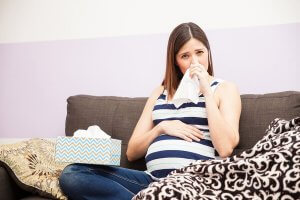Pregnancy and Flu: What You Should Know

Without a doubt, pregnancy and flu is a delicate combination for every woman. Knowing what we’re going to face against this illness and responding quickly are our best options.
Staying away from people who have flu symptoms is the best safety measure for getting rid of the infection. However, we know that in any case, there’s still a possibility of contracting the virus.
It’s certainly difficult for pregnant women to fight infections since they’re an easy target for the flu virus and other diseases. We can’t avoid 100% of the influenza contamination, but there’s a flu vaccine we can receive in medical centers, which is very helpful.
After being vaccinated, pregnant women get sick less often and prevent the occurrence of a serious episode that could endanger their lives or the babies’. There are two types of flu vaccines: the one that is injected and one that is given as a nasal spray.
The injectable vaccine is the best option for pregnant women. It contains the inactive virus, which is why it’s unlikely for them to get the flu. The nasal spray, on the other hand, doesn’t have the mandatory medical approval that doctors need to be able to supply it to pregnant women.
Influenza vaccines do have some side effects, such as: headaches and muscle pain, fever, nausea, vomiting, and a bit of redness where you receive the injection.
These effects don’t last more than two days. If they endure for a longer period of time, you should consult your doctor immediately.
If a pregnant woman is infected with the flu, it’s best not to self-medicate and only ingest the antiviral medicine that the doctor prescribes.
Complications caused by the combination of pregnancy and flu
A woman should seek to protect herself from the flu during the first trimester of pregnancy, in particular.
If the future mother suffers from other complications, like obesity, diabetes, or asthma, the risk of complicating the pregnancy increases with influenza.
A flu episode that doesn’t heal properly can lead to fatal consequences, such as lung disease. Fortunately, the flu doesn’t cross the placental barrier. This means it can’t contaminate the fetus.
If you believe you have a flu infection, it’s best to begin taking the appropriate safety measures within 48 hours and for 5 days to finish off the virus.

How to avoid getting the flu while being pregnant
Influenza is a respiratory system disease caused by the influenza virus. During pregnancy, the immune system is more exposed, so the chances of contracting it increase.
This virus can pass from one person to another by hand contact, a few drops of saliva while coughing, or touching contaminated objects.
It’s likely for most mothers to go through one or two cases of flu during their pregnancy. Although, you should consider some safety measures to prevent it:
- Avoid places with lots of people.
- Wash your hands regularly.
- Don’t touch tissues or pieces of cloth used by someone who has the flu.
- Don’t eat any kind of food or drink with a kitchen utensil that isn’t properly sanitized.
- If you’re pregnant and already developing the virus, it’s best to rest and stay hydrated.
“Staying away from people who have flu symptoms is the best safety measure for getting rid of the infection. In any case, there’s always a possibility of contracting the virus.”
Symptoms that should alert you regarding pregnancy and flu
If you notice any of the following signs when you have the flu during pregnancy, go to your doctor as soon as possible:
-
Feeling dehydrated
Dehydration is common for this pathology. The important thing is to replenish your liquids with hot broths, vegetable purees, or vitamin C juices.
-
Little appetite
A pregnant woman must take care of her diet despite having the flu since the correct development of the fetus will depend greatly on it.
It’s common to have loss of appetite. However, a conscious mother should know that even if she isn’t hungry, she must eat well and at the right times for the sake of her baby.
-
Fever
Medical treatment is essential to control a fever. You should monitor it rigorously and not allow it to exceed 38.5 °C (101.3 °F).

-
Respiratory problems
To prevent nasal mucus and sinusitis, it’s good to perform nasal washes with seawater. One of the most latent dangers of getting the flu is that it can get difficult when the mother’s defenses are low.
That’s why it’s important to ingest juices rich in vitamin C when the flu attacks. This condition is very similar to a cold. The difference is in the high fever and the strong pain all over the body.
Dealing with it on time should be a priority. The combination of pregnancy and flu brings with it discomfort and complications that no woman wants to experience.
Finally, not alarming yourself, keeping calm, and having a good doctor by your side is the best recipe to fight the flu during the best stage that a woman can live.
Without a doubt, pregnancy and flu is a delicate combination for every woman. Knowing what we’re going to face against this illness and responding quickly are our best options.
Staying away from people who have flu symptoms is the best safety measure for getting rid of the infection. However, we know that in any case, there’s still a possibility of contracting the virus.
It’s certainly difficult for pregnant women to fight infections since they’re an easy target for the flu virus and other diseases. We can’t avoid 100% of the influenza contamination, but there’s a flu vaccine we can receive in medical centers, which is very helpful.
After being vaccinated, pregnant women get sick less often and prevent the occurrence of a serious episode that could endanger their lives or the babies’. There are two types of flu vaccines: the one that is injected and one that is given as a nasal spray.
The injectable vaccine is the best option for pregnant women. It contains the inactive virus, which is why it’s unlikely for them to get the flu. The nasal spray, on the other hand, doesn’t have the mandatory medical approval that doctors need to be able to supply it to pregnant women.
Influenza vaccines do have some side effects, such as: headaches and muscle pain, fever, nausea, vomiting, and a bit of redness where you receive the injection.
These effects don’t last more than two days. If they endure for a longer period of time, you should consult your doctor immediately.
If a pregnant woman is infected with the flu, it’s best not to self-medicate and only ingest the antiviral medicine that the doctor prescribes.
Complications caused by the combination of pregnancy and flu
A woman should seek to protect herself from the flu during the first trimester of pregnancy, in particular.
If the future mother suffers from other complications, like obesity, diabetes, or asthma, the risk of complicating the pregnancy increases with influenza.
A flu episode that doesn’t heal properly can lead to fatal consequences, such as lung disease. Fortunately, the flu doesn’t cross the placental barrier. This means it can’t contaminate the fetus.
If you believe you have a flu infection, it’s best to begin taking the appropriate safety measures within 48 hours and for 5 days to finish off the virus.

How to avoid getting the flu while being pregnant
Influenza is a respiratory system disease caused by the influenza virus. During pregnancy, the immune system is more exposed, so the chances of contracting it increase.
This virus can pass from one person to another by hand contact, a few drops of saliva while coughing, or touching contaminated objects.
It’s likely for most mothers to go through one or two cases of flu during their pregnancy. Although, you should consider some safety measures to prevent it:
- Avoid places with lots of people.
- Wash your hands regularly.
- Don’t touch tissues or pieces of cloth used by someone who has the flu.
- Don’t eat any kind of food or drink with a kitchen utensil that isn’t properly sanitized.
- If you’re pregnant and already developing the virus, it’s best to rest and stay hydrated.
“Staying away from people who have flu symptoms is the best safety measure for getting rid of the infection. In any case, there’s always a possibility of contracting the virus.”
Symptoms that should alert you regarding pregnancy and flu
If you notice any of the following signs when you have the flu during pregnancy, go to your doctor as soon as possible:
-
Feeling dehydrated
Dehydration is common for this pathology. The important thing is to replenish your liquids with hot broths, vegetable purees, or vitamin C juices.
-
Little appetite
A pregnant woman must take care of her diet despite having the flu since the correct development of the fetus will depend greatly on it.
It’s common to have loss of appetite. However, a conscious mother should know that even if she isn’t hungry, she must eat well and at the right times for the sake of her baby.
-
Fever
Medical treatment is essential to control a fever. You should monitor it rigorously and not allow it to exceed 38.5 °C (101.3 °F).

-
Respiratory problems
To prevent nasal mucus and sinusitis, it’s good to perform nasal washes with seawater. One of the most latent dangers of getting the flu is that it can get difficult when the mother’s defenses are low.
That’s why it’s important to ingest juices rich in vitamin C when the flu attacks. This condition is very similar to a cold. The difference is in the high fever and the strong pain all over the body.
Dealing with it on time should be a priority. The combination of pregnancy and flu brings with it discomfort and complications that no woman wants to experience.
Finally, not alarming yourself, keeping calm, and having a good doctor by your side is the best recipe to fight the flu during the best stage that a woman can live.
All cited sources were thoroughly reviewed by our team to ensure their quality, reliability, currency, and validity. The bibliography of this article was considered reliable and of academic or scientific accuracy.
- Pregnant women and influenza (Flu). Centers for Disease Control and Prevention. [Online] Avaiable at: https://www.cdc.gov/flu/protect/vaccine/pregnant.htm
- Influenza and pregnancy: a guide for doctors and midwives. Inmunisation Coalition. 2018. [Online] Avaiable at: http://www.immunisationcoalition.org.au/wp-content/uploads/2018/02/Pregnancy_WEB.pdf
This text is provided for informational purposes only and does not replace consultation with a professional. If in doubt, consult your specialist.








